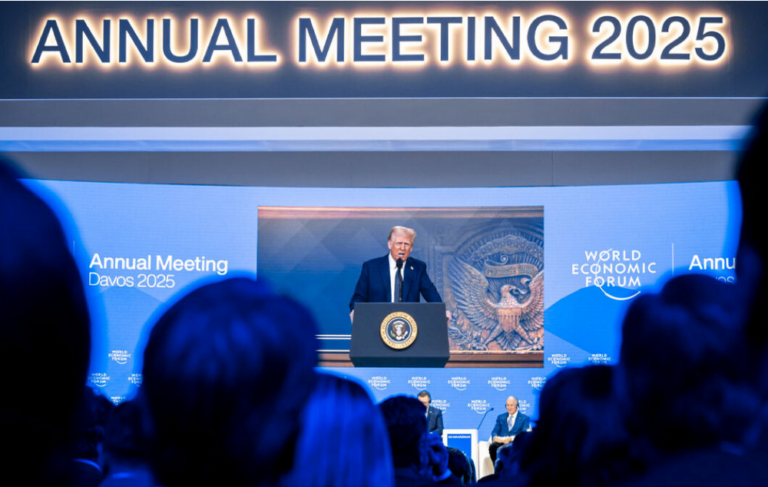Donald Trump is undoubtedly the politician with the heaviest workload on the planet this past week. This, however, did not prevent him from sparing a few moments to address the World Economic Forum in Davos, even if only virtually. Trump, showing no signs of haste or fatigue, delivered his speech and then responded in his distinct “different” style to a series of questions from five high-ranking executives across various economic sectors.
Beyond what he has already highlighted—and turned into executive orders—the way the U.S. President chose to comment again on the European Union drew significant attention. Trump’s statement, “I love Europe but not the European Union,” set the tone for the third consecutive day regarding his administration’s stance toward the other side of the Atlantic. Trump insists that bilateral relations are built through trade balances, and the significant disparity in this economic indicator “irritates” him.
Trump also focuses on two specific categories—cars and agricultural products—and this is no coincidence. The 47th U.S. President knows well that these two sectors contribute significantly to the U.S. trade deficit, and he has no intention of ignoring or bypassing the issue, even as Europe deals with other, more pressing matters, such as the war raging in the eastern part of the continent for a third year. For Trump, politics is built on economic relationships, and he will not deviate from this perspective under any circumstances.
The three consecutive attacks on European institutions are not “spontaneous” moves. Trump, as the 47th President, is far less “spontaneous” than Trump as the 45th President. He now knows exactly how to maneuver and will do what no one can forbid him from doing in his position—apply pressure. However, to be fair, the question marks do not originate from Washington and its new approach to managing situations. The European Union has not responded to the attacks of a president who is also a long-standing ally. In fact, it has not uttered a word.
None of the institutions in Brussels have come forward to express dissatisfaction or emphasize that Europe is also of vital importance to the U.S. For example, the neighboring countries of Canada to the north and Mexico to the south have made their positions clear. Despite political upheavals, Canada, under both outgoing Prime Minister Trudeau and the opposition, has firmly stated that tariff threats will not stand. Mexico, through its president, has clarified that unilateral actions such as renaming the Gulf of Mexico are not the way to conduct foreign policy or dialogue. Yet, the EU has not even hinted through unofficial channels that Brussels has its own strategy to protect the well-being and progress of its population—one that, in sheer numbers, exceeds that of the U.S.
Worse than Brussels’ “silence,” however, is the fact that instead of a reaction, there are voices calling for submission to U.S. demands, surrendering “land and water” to a president who, as they argue, “no one can resist.” The Europe of 27, despite its significant internal differences, remains an entity that lacks homogeneity and, most importantly, appears to lack the resolve to stand up to challenges. It is precisely this weakness and apparent fear that serve as “butter on the bread” of a historically risk-taking businessman who has ascended to the highest political office in the U.S. for the second time.
Trump has an agenda, and he does not need time. In contrast, Europe seems unprepared and more “exposed” in terms of political leadership than ever before. Should the “battle of tariffs” materialize, it is unlikely to last long, as resistance from the European side appears poised to crumble.
Ask me anything
Explore related questions





